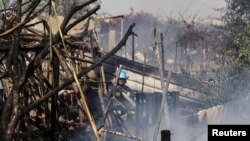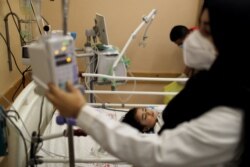U.N. agencies said conditions in Gaza continue to deteriorate nine days into the Israeli-Palestinian crisis. In Gaza, 200 people reportedly have been killed and more than 6,000 injured. Twenty people have been killed in the West Bank, and Palestinian rocket attacks into populated areas of Israel reportedly have killed 10 people and injured 800.
The U.N. Office for the Coordination of Humanitarian Affairs (OCHA) said it welcomes the decision by Israeli authorities to open the Kerem Shalom border crossing, allowing essential humanitarian supplies to enter Gaza. It urges Israel also to open the Erez Crossing, so critical humanitarian staff can move in and out of Palestinian territory.
OCHA said days of intense fighting and the destruction and damage to hundreds of buildings and houses has displaced nearly 47,000 people in Gaza. They reportedly have sought refuge in 58 schools run by UNRWA, the U.N. Relief and Works Agency.
OCHA spokesman Jens Laerke said the North Gaza Seawater Desalination Plant is still not operational, depriving a quarter million people access to drinking water.
“In total, an estimated 800,000 people are lacking regular access to safe water. … The need for food and cash support is also increasing," Laerke said. "All fishing activity remains prohibited off the Gaza coast. As far as the security situation allows, the United Nations, along with our humanitarian partners, are providing food and nonfood items to displaced families in Gaza, and immediate cash assistance to more than 52,000 people.”
Since the start of Ramadan, the World Health Organization has recorded 91 attacks on health care facilities in Gaza and the West Bank, including East Jerusalem. It says 19 health facilities have been damaged in the Gaza Strip, including six hospitals and nine primary health care centers.
WHO spokeswoman Margaret Harris says Gaza only has 46% of essential drugs and 33% of essential medical supplies in stock. That is less than a one-month supply needed to treat the sick and injured.
“The damage to WASH infrastructure, including the water networks in North Gaza Seawater Desalination Plant is affecting public health measures that are needed in COVID-19 but also the risk of water borne diseases. … And as you know, during COVID-19, one of the things that you need to do is avoid mass gatherings and avoid crowding,” Harris said.
Harris notes that is impossible given the tens of thousands of displaced people seeking refuge in overcrowded school facilities. She said the WHO needs $11 million to mount an urgent health response in the coming three months.
Laerke tells VOA that OCHA has received no response or pushback from Israeli authorities regarding its assessment of conditions in Gaza. VOA calls to Israeli authorities on the subject have gone unanswered.






